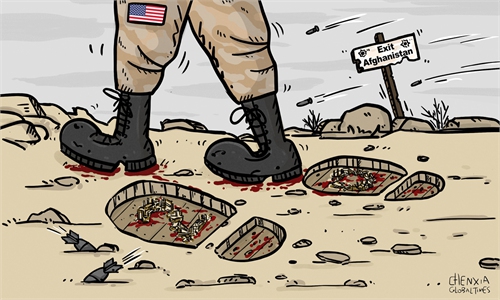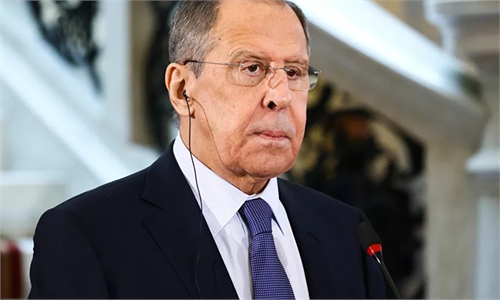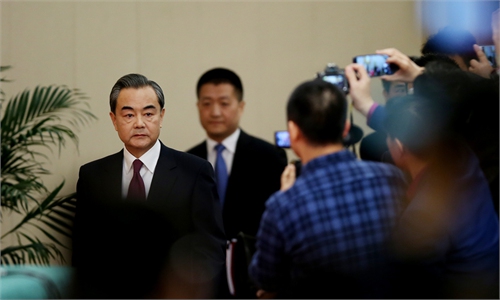
China Russia. Photo: VCG
President Joe Biden's decision on the swift withdrawal of American military forces from Afghanistan by August 31 has had a very different acceptance among US politicians. Donald Trump, who initiated this pullout move and wanted to speed it up before presidential elections, supported the decision. Former US president George W. Bush, who actually dispatched the military to Afghanistan after September 11 attacks in 2001 to bash Al -Qaeda, has slammed the move saying the consequences will be "unbelievably bad" especially for Afghan women and girls.Beijing and Moscow have also raised vocal criticism over Washington's decision. Moscow expects uncertainty around the political and military situation in Afghanistan in the aftermath of the US' hasty withdrawal. Foreign Minister Sergei Lavrov listed upsurges in terrorism, drug trafficking and instability spillover to neighboring countries as key threats to regional security. Beijing similarly has reprimanded Washington for being "the origin of problems in Afghanistan." China is also concerned that the deterioration of security in Afghanistan may become a thriving ground for terrorist organizations.
Earlier this month after the US completed 90 percent of its withdrawal from Afghanistan, the Taliban claimed that it had gained control of 85 percent of the country's territory. It has already led to a quick deterioration of the security situation. In early July, more than 1,000 Afghan soldiers fled to Tajikistan following clashes with the Taliban.
China and Russia pursue stability in the region which borders their territories and acts as an important area for advancing their geo-strategic interests. Moscow promotes its regional agenda via its political-military connections with the former Soviet republics with the help of its two military outposts in Kyrgyzstan and Tajikistan. The latter hosts 6,000 Russian servicemen and it was recently reported to be reinforced in the face of growing Taliban threats.
Moscow is set to conduct series of counter-terrorism drills with Tajikistan, Uzbekistan and Kyrgyzstan in August-September. This will culminate with a massive SCO-led joint military anti-terrorist exercise called "Peace Mission-2021."
China engages in the region mainly through its economic activities under the Belt and Road Initiative, along with its multiple projects.
Russia's prime concern for now besides resurging of terrorism in Afghanistan and destabilizing trans-border activity is a possible relocation of US troops to the countries neighboring Afghanistan, which Moscow deems "unacceptable" and puts this on the negotiating table with the American side during the Putin-Biden talks in Geneva. Moreover, any deployment of foreign troops in Kazakhstan, Kyrgyzstan and Tajikistan must be done via the Collective Security Treaty Organization to which three are member-states.
China's paramount concern is the East Turkistan Islamic Movement, which could combine efforts with the Taliban and collectively spill over into the Xinjiang region - a home to China's Uygur Muslim minority.
Despite some circulating speculations that Russia and China are pursuing different if not competing agendas in Afghanistan, the ongoing diplomatic process does not uphold such a claim. As mentioned above, the instruments for Russian and Chinese participation in regional affairs differ, but their interests are mostly aligned and concentrate on cementing peace and stability, preventing the spread of terrorism, extremism and drug-trafficking. Moscow and Beijing facilitate more active role of Shanghai Cooperation Organization (SCO) - a trend spotted by expert community of Russia and China and highlighted by official statements.
During his July trip to the region preceding a meeting of foreign ministers of the SCO-Afghanistan contact group, Chinese Foreign Minister Wang Yi, called for a restart of intra-Afghan negotiations in order to "achieve political reconciliation." Following this, Russian Foreign Minister Sergei Lavrov raised similar propositions, stressing the need for "meaningful intra-Afghan negotiations, aiming to stop the years-long Afghan conflict." Lavrov said the solution to the conflict lies in forming an inclusive coalition government, represented by all groups of the Afghan society. Currently, Russia expects India, which is a member of the SCO, and Iran, an observer state of SCO, to join the "Troika" format of Russia, China, the US and Pakistan. This will help to commonly translate to Washington the interests of regional parties discussed in closer SCO meetings.
Minister Wang said that the SCO should "actively take part in meetings of multilateral mechanisms on Afghanistan and contribute to the resolving of practical issues."Following July 15 talks in Tashkent, Minister Wang and Minister Lavrov reaffirmed the two countries' commitments to facilitating the Afghan settlement process through the SCO-Afghanistan Contact Group. Indeed, this mechanism has been functioning quite "effectively" so far.
In essence, Moscow and Beijing are not likely to follow Washington to place forces on the ground in Afghanistan. This has been estimated by both sides as a faulty move. On the contrary, both states have prioritized political solutions, saluting a more active role for SCO in regional affairs.
The author is an expert at the Russian International Affairs Council. opinion@globaltimes.com.cn



